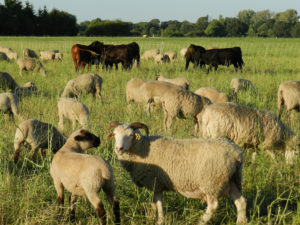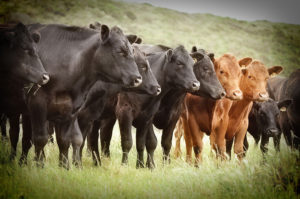מטות
Parsha Mattot
Bamidbar (Numbers) 30:2-32:42
“And Mosheh spoke to the heads of the tribes concerning the children of Yisra’el, saying, “This is the wordwhich YaHuWaH has commanded:”– Bamidbar (Numbers) 30:1
Mosheh (Mushah) gives instruction to the heads (roshay רָאשֵׁי) of the tribes (mattoth מטות) regarding the laws of vows and oaths:
Bamidbar (Numbers) 30:2“When a man vows a vow to YaHuWaH, or swears an oath to bind himself by some agreement, he does not break his word, he does according to all that comes out of his mouth.
The wording in the Hebrew (Abryt/Ibrit) is important here because truly the word translated vow, which is נֶדֶר neder has no true English equivalent. It essentially is a type of vow however one that changes the status of a particular object or deed. This would be when an individual proclaims that he will abstain from some object or deed that the Torah does not prohibit which is the subject of this passage. However נֶדֶר neder can also apply to one obligating oneself to bring an optional offering to YaHuWaH. The wording in Hebrew for swearing an oath, הִשָּׁבַע שְׁבֻעָה is hisheba shebuah. Interesting side note is that שבע sheba also means seven and שְׁבֻעָה sebuah means week. This is connecting the idea and showing us that Shabbat is a swearing of an oath, a seven that gives us a week. However that does not directly relate to this passage except to illustrate that the weekly Shabbat is a swearing of an oath that comes from YaHuWaH, the Creator. שְׁבֻעָה Shabuah here is used in the since of an oath that one declares verbally that he will obligate himself to do. It does not change the status of an object or action like the neder. For an amusing example we could make a neder to not eat grapes. This essentially gives man the ability to make the grape a prohibition for whatever span of time to that particular person. Meaning that there word is as a Torah law in this case. However if one makes a shabuah it would involve doing something, for example making a shabuah to eat a grape. This does not change the status of the grape like the neder can. The neder and shabuah is binding to the person’s being or nephesh. By our words we are judged before the Creator of the Universe who used words to formulate all that is seen and unseen. Our words make us who we ultimately are and who we will become.
Neder and shabuah, however, can be annulled in various situations. A father has the authority to annul the vows of his daughter, and a husband the vows of his wife or betrothed, as long as the annulment is made before the sun goes down on the day he learns of it. A panel of judges can make an annulment as well.
After the instructions regarding the neder and shabuah, YaHuWaH instructs Mosheh to avenge the vengeance of the children of Yisrael upon the Midianites. Twelve thousand men, one thousand from each tribe along with El’azar and the Qodesh instruments waged war on Midian, slaying all the males within. The five kings of Midian Evi, Rekem, Tzur, Hur and Reva along with the false prophet Bil’am were all killed in the war. “All the women of Midian, and their little ones” were captured along with all “the spoil of all their cattle, and all their flocks, and all their goods.”
Upon their return, however, Mosheh, El’azar and all the princes went outside the camp to meet them. Mosheh was extremely angry that the women who had made the children of Yisra’el (Yashar’al) worship Ba’al Peor were kept alive and commanded that the male children be killed along with all the women who had been intimate with a man. All the female children were kept alive.
Due to the unclean status of the warriors Mosheh tells them to undergo the seven day purification process for one who comes in contact with the dead, while Elazar instructs them on the laws of hagalah ( cleansing of utensils of the unclean food engrossed in them), by which to cleanse the “gold, silver, copper, iron, tin and lead” utensils captured in the war.
Everything that passes through the fire, you shall make it go through the fire . . . and all that does not pass through the fire shall you make to go through water.
A sum is calculated of the spoils taken in the war on Midian, which include: 675,000 sheep; 72,000 heads of cattle; 61,000 donkeys; and 32,000 human captives. Half was given to the soldiers who fought in the war, who in turn gave 1/500 of their share to the Kohen HaGadol,(high priest); the other half was divided among the people, who gave 1/50 of their share to the Levites. This means the high priest received 675 sheep, 72 cattle, 61 donkeys and 32 human captives; while the Levites received 6,750 sheep, 720 cattle, 610 donkeys and 320 human captives.
The officers who were over the thousands brought a donation of gold totaling 16,750 shekels which is about 837 pounds to make atonement for their lives before YaHuWaH. This was because not one man was lost in the battle against Midian.
It is important that not one of YaHuWaH’s soldiers died because the battle against Midian was a purely spiritual battle. When the princes and leaders realized not one of the soldiers were dead in their militia they realized that this was not for their sake but for the great Name sake of YaHuWaH, so therefore they offered gifts of great value as a kiporah or covering atonement.
In a previous Torah portion we see that people of Yisra’el (Yashar’al) had conquered the lands of Sichon and Og, which lay east of the Yarden (Jordan River). The children of Reuben and Gad had a great multitude of cattle and looked to the land of Yaazer and Gilead as great places for their cattle. Thus they came to Mosheh and El’azar and the princes of the assembly and they said “. . . let this land be given to your servants for a possession; do not take us across the Yarden.”
Mosheh continues on to remind them of how their fathers had committed a similar act when they brought the evil report of the land and how YaHuWaH was enraged with them forcing them to wonder the desert for forty years.
However the Reubenites and the Gadites persist. “We will build sheepfolds here for our cattle, and cities for our little ones.” But we have no intention to remain behind while the rest of the people fight for the conquest of the Land; indeed, we promise to march at the fore of the troops and fight in the front lines. “We will not return to our houses, until the children of Israel have inherited every man his inheritance.”
Mosheh agrees as long as they fulfill their word. Half of the tribe of Manasseh joined the tribes of Reuben and Gad in settling the territories east of the Yarden.
This Torah Portion teaches us many principles but one of the greatest is the concept of living up to the words that we speak. YaHuWaH sets forth all barriers and limitations by the power of his mouth, in so making man in his image after his pattern he has loaned man the limited capability of doing so similarly with words. We know that Mashyach is the living, breathing word of YaHuWaH. Messiah is the Torah therefore it is vital for those of us who are his students to be mindful and keenly aware our words.




